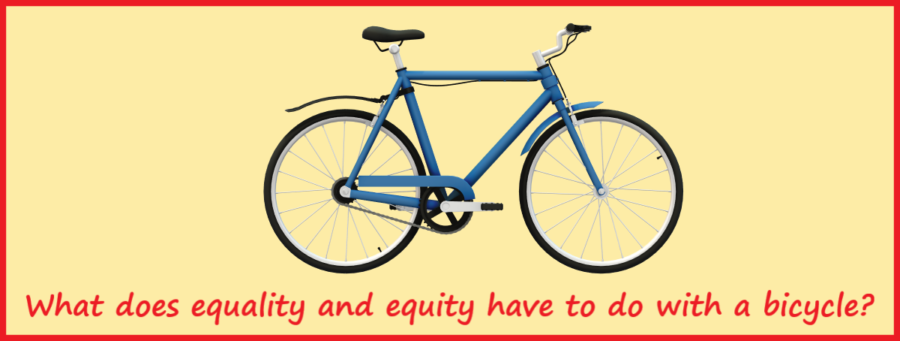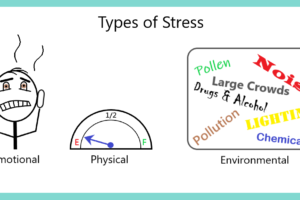Recently the words equality and equity have been used in the news as two almost interchangeable words. While I thought I understood the distinction, I was only partially correct. Both equality and equity are about fairness and justice.
However, the path each takes to arrive at the goal is very different. These terms and philosophies are NOT interchangeable. If you fervently believe in one, you probably vehemently oppose the other.
The General Assembly of the United Nations proclaimed September 15th as the International Day of Democracy. The term and spirit of democracy is tied to the concept of equality.
Visualizing Equality and Equity
For those wanting a quick guide to the difference between equality and equity, think about a “medium” size bike, a one size fits all bicycle. Now visualize a very tall person trying to ride the one size fits all bike. Now visualize a very small person, maybe a child, trying to ride the same medium, one size fits all bike. One size for all; that is equality.
Now visualize three different size bikes. First visualize a large bike for the larger person. Now visualize a medium size bike for the average size person, and a small bike, or a child’s size bike, for the smaller person. Three bike sizes to accommodate the different sizes of people; that is equity.
The bike example is a very simplistic way of thinking about the differences between equality and equity. Ah, if the two concepts were so simple in reality!
In reality, making three or more sizes of bikes doesn’t impact or affect anyone except maybe the bike makers and the stores needing more space for selling different size bikes.
Social, cultural and financial equity affects many, benefitting one group while likely penalizing another.
Definition of Equality
When people think about equality, they may think about democracy and the Declaration of Independence, specifically the phrase “equality for all”. Those who have studied the Declaration of Independence believe Thomas Jefferson did not mean individual equality, but rather that American colonists, as a people, had the same rights to self-government as other nations (equality with other countries).
Today, equality is defined as having access to, and the distribution of, a set of resources evenly across all individuals. Specifically, with equality, each person or group is treated in exactly the same exact way, regardless of social, cultural or financial differences.
To use a sports analogy, people who advocate for equality-based solutions to social issues believe everyone starts off on the same equal playing field. People are then able to increase what they have in life based on the amount of work they put into improving the quality of their life.
Perhaps a personal example would be helpful.
Example: When I went to graduate school, I applied to four universities in the Boston area. Each grad school taught classes on how to lead a therapy group, something that was of interest to me. Interestingly, the four universities (2 public and 2 private) used exactly the same book! This is an example of equality in education.
Equality means providing the same to all. Everyone gets the same, regardless if it is needed or right for them.
Definition of Equity
Equity attempts to identify and eliminate social, cultural and financial barriers that prevent the full participation of some groups of people in the larger society. This philosophy is based on the premise life is not an even playing field and that not everyone has access to the same resources.
With equity, resources are not distributed equally to everyone, but only to the people who are in need. Providing “more” to some, but not to everyone, is equity’s way of suggesting everyone could thrive as the result of redistribution.
The goal of equity is to challenge systemic and structural barriers that interfere with the ability of some groups to thrive. With equity there is a recognition that each person has different circumstances, and resources and opportunities need to be reallocated.
Financial redistribution is usually the focus when equity is discussed, but it isn’t the only resource. Changing standards for some groups is another way that resources are reallocated. Providing more for a group of people who have been denied access to resources also applies.
Perhaps another personal example would be helpful.
Example: Due to Achilles tendon surgery I was in a wheelchair for three months. While I would never compare my three-month experience with someone who has to use a wheelchair 24/7, it certainly opened my eyes to the lack of accessibility, from buildings, stores and restaurants I could not get into, to not providing handicapped accessible bathrooms, to not being able to use a credit card keypad because it was too high for me to see and reach.
Equity means providing all people, individuals or groups, with what they need to thrive regardless of the cost. Handicapped accessibility is an example of equity, striving to make all buildings and bathrooms accessible to the physically challenged.
The Robin Hood Effect of Equity
One of the earliest examples of equity may have been the story of Robin Hood. Robin Hood believed there was a financial imbalance in his community. That is when he decided to redistribute money from the rich and give it to the poor.
Effective May 1, 2023, the Biden administration, in its efforts toward equity, has become Robin Hood of sorts to new home buyers. Since it is now after May 1st, if you are buying a new home, you will be affected by the new Loan-Level Pricing Adjustment or LLPA.
The following is the definition from the FDIC as to what an LLPA is:
A risk-based pricing adjustments that vary based on credit score, loan-to value ratio, type of product, and various other factors, charged at the time of origination. Fannie Mae and Freddie Mac charge both annual guarantee fees and upfront LLPAs. Most lenders convert LLPAs into the interest rate on the mortgage, which the borrower pays over time. https://www.fdic.gov/resources/bankers/affordable-mortgage-lending-center/guide/part-1-docs/glossary-and-terms.pdf
To explain what this means in less convoluted double speak, this is what LLPA means to someone who is thinking about buying a house:
- Homebuyers with credit scores between 680 and 779, with a low debt to income ratio (DTI) who have a down payment of between 10% and 20% of the asking price will see a LLPA fee increase of between 0.13% and 0.75%.
In plain talk: You will pay a LLPA if you have a good to excellent credit score, a low DTI and the ability to make a down payment of 10-20%.
- Homebuyers with credit scores of less than 680 with a high debt to income ratio, with a low household income who have a down payment of less than 5% down, will pay no LLPA fees whatsoever.
In plain talk: You will pay no LLPA fees if you have a low credit score, a high DTI and are make a down payment of less than 5% down.
https://www.housingwire.com/articles/datadigest-correcting-the-record-on-llpa-updates/
The equity finance theory is that if you have a poor credit score, a high DTI and no savings it isn’t because you have been living above your means, it must be due to social, cultural or financial inequities. And instead of figuring out how to help the truly needy and weed out the irresponsible, the solution across the board is a Robin Hood scheme.
To read another example of how being fiscally responsible can cost you money, please read my blog about being a Credit Ghost. How Does Being A RVing Credit Ghost Effect Your Future?
Take Away Point
Equality and equity may start off as both being about fairness and justice, but they quickly go in their own separate paths. This blog, just as all the others I have written, is intended to make you think. You don’t have to agree or disagree with me.
No content in this blog was created by AI (artificial intelligence). The information presented is the perspective of the author and material amassed from 40+ years as a clinical social worker.
Thank you so much for reading this blog. If you enjoyed the content, please check out other blogs at:
https://relationshipsrelearned.com/my-blog/
https://rvingnomads.com/blog/
You can now view my books that are available on my Amazon Authors Page.
To be notified of future posts, please enter your email address and click on the Subscribe button.












